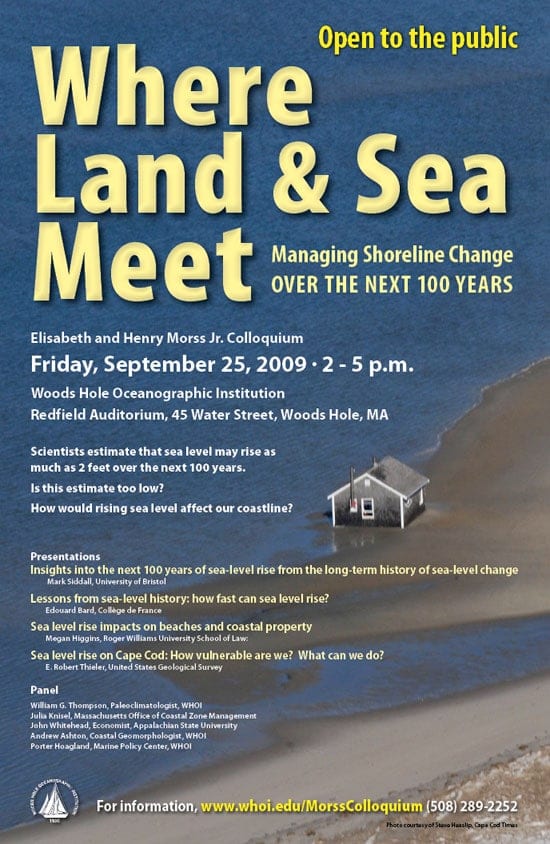WHOI Will Host Public Forum on Sea Level Rise
September 21, 2009
The Intergovernmental Panel on Climate Change estimates that sea level may rise as much as two feet over the next 100 years. However, we lack a full understanding of polar ice cap behavior, and there is concern that the potential for future sea level rise may be significantly underestimated. How fast can sea level rise? How would rising sea level affect coastline and how could we best manage those changes?
On Friday, September 25, 2009, from 2 – 5 p.m., in Redfield Auditorium, Water Street, Woods Hole, the Woods Hole Oceanographic Institution (WHOI) is hosting a free public colloquium entitled “Where Land & Sea Meet: Managing Shoreline Change Over the Next 100 Years.”
The colloquium and panel discussion will highlight connections between cutting-edge sea level research, societal impacts of sea level rise, and public policy response.
The colloquium will begin with four short (20 minute) talks to set the stage for a panel discussion and Q&A session with the audience. The speakers and talks include:
- “Insights into the next 100 years of sea-level rise from the long-term history of sea-level change,” Mark Siddall, University of Bristol
- “Lessons from sea-level history: how fast can sea level rise?” Edouard Bard, Collège de France
- “Sea level rise impacts on beaches and coastal property,” Megan Higgins, Roger Williams University School of Law
- “Sea-level Rise on Cape Cod: How Vulnerable Are We? What Can We Do?” Rob Thieler, USGS Woods Hole
The panel discussion will include:
- William G. Thompson, paleoclimatologist, WHOI
- Julia Knisel, Massachusetts Office of Coastal Zone Management
- John Whitehead, economist, Appalachian State University
- Andrew Ashton, coastal geomorphologist, WHOI
- Porter Hoagland, Marine Policy Center, WHOI
The public forum is part of an ongoing series, called Morss Colloquia, to address issues of global importance that confront the human race. Created by a generous gift by Elisabeth W. and Henry A. Morss, Jr., the Morss Colloquia go beyond routine scientific meetings, to expose the Institution’s staff and public community to new issues and new perspectives that cross disciplinary boundaries between the sciences and social sciences.
Elisabeth and Henry once wrote “there is not a living cell that will remain unaffected in the next century by what humans do and fail to do.” They foresaw the Morss Colloquia as a way to heighten awareness and promote understanding among our community that addresses the serious global problems confronting the human race today. They envisioned an interdisciplinary link-up between the present and the future in seeking an integrated overview of research and discovery. “An expanding world needs an expanding dialogue and with a better global perspective, the meeting of minds can mean a happy introduction of new advances in knowledge and thinking into human and planetary acceptance.”
More information is available on the Web at www.whoi.edu/MorssColloquium or by calling 508-289-2252.
The Woods Hole Oceanographic Institution is a private, independent organization in Falmouth, Mass., dedicated to marine research, engineering, and higher education. Established in 1930 on a recommendation from the National Academy of Sciences, its primary mission is to understand the oceans and their interaction with the Earth as a whole, and to communicate a basic understanding of the oceans’ role in the changing global environment.

